Critical Analysis of The Matrix - Desklib
VerifiedAdded on 2022/08/09
|6
|1307
|53
AI Summary
This critical analysis of The Matrix explores the underlying themes and messages in the movie. The article discusses the influence of various philosophical texts, the portrayal of society, and the virtual nature of the symbolic order. The article also draws attention to the problems associated with a system that integrates its consumers from above. The study material with solved assignments, essays, dissertations, and more is available on Desklib.
Contribute Materials
Your contribution can guide someone’s learning journey. Share your
documents today.
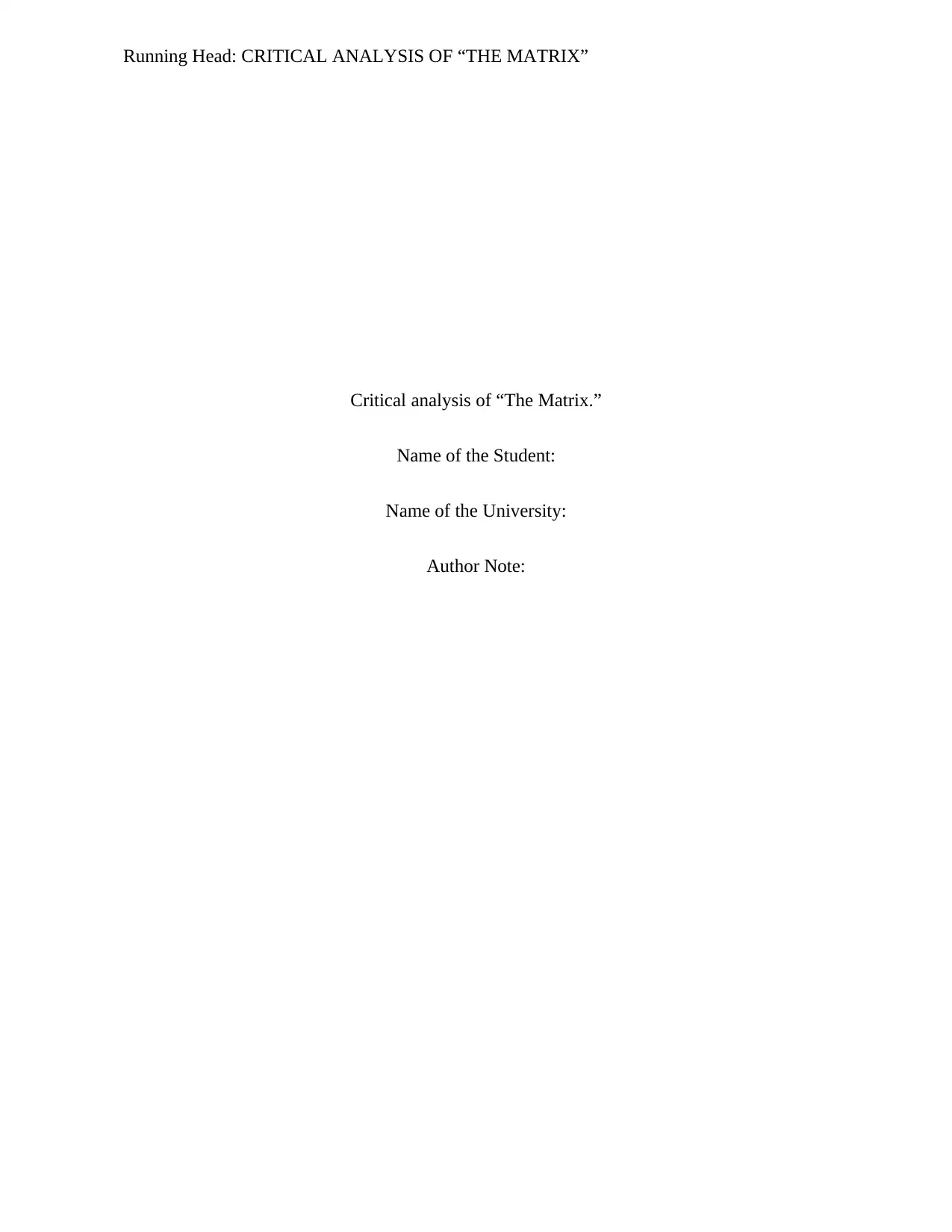
Running Head: CRITICAL ANALYSIS OF “THE MATRIX”
Critical analysis of “The Matrix.”
Name of the Student:
Name of the University:
Author Note:
Critical analysis of “The Matrix.”
Name of the Student:
Name of the University:
Author Note:
Secure Best Marks with AI Grader
Need help grading? Try our AI Grader for instant feedback on your assignments.
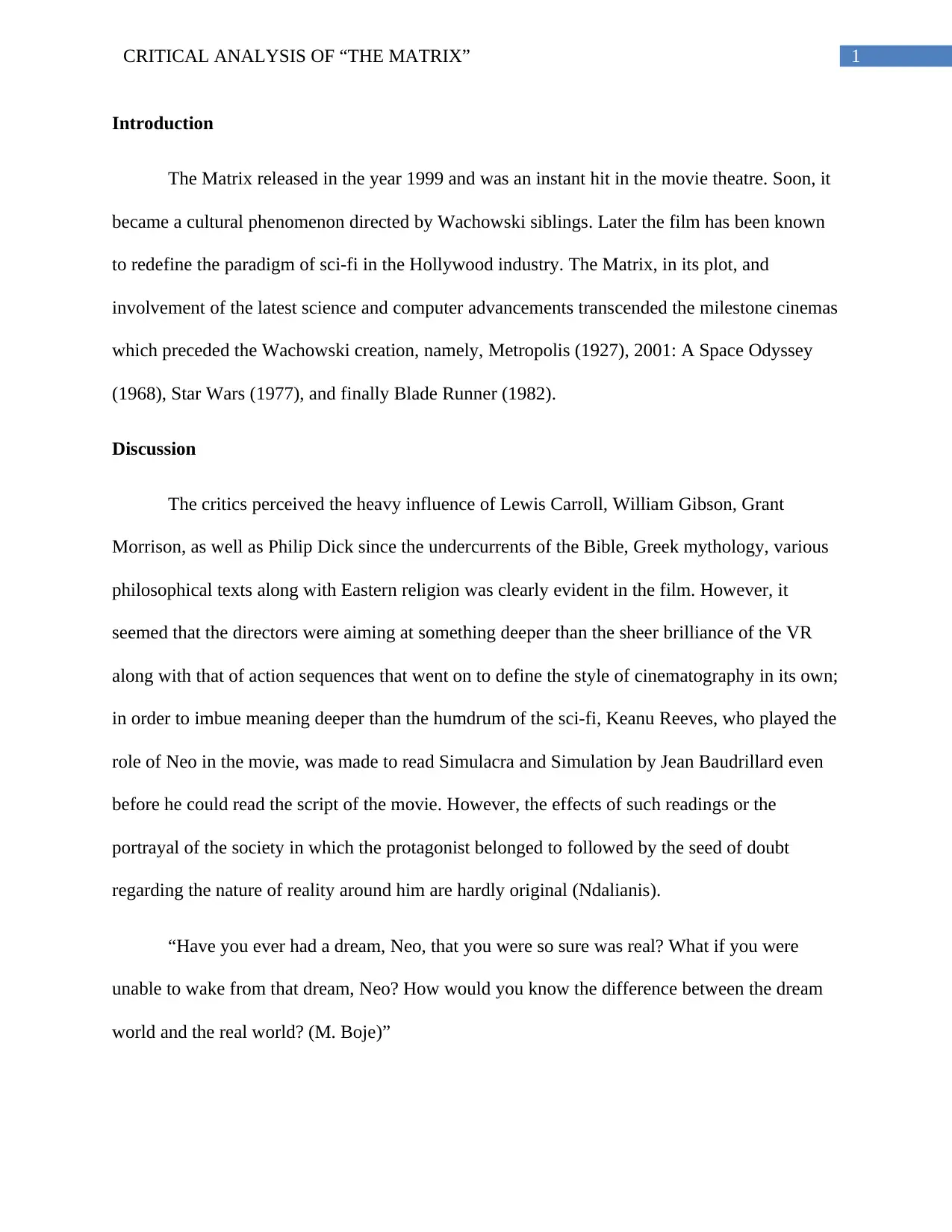
1CRITICAL ANALYSIS OF “THE MATRIX”
Introduction
The Matrix released in the year 1999 and was an instant hit in the movie theatre. Soon, it
became a cultural phenomenon directed by Wachowski siblings. Later the film has been known
to redefine the paradigm of sci-fi in the Hollywood industry. The Matrix, in its plot, and
involvement of the latest science and computer advancements transcended the milestone cinemas
which preceded the Wachowski creation, namely, Metropolis (1927), 2001: A Space Odyssey
(1968), Star Wars (1977), and finally Blade Runner (1982).
Discussion
The critics perceived the heavy influence of Lewis Carroll, William Gibson, Grant
Morrison, as well as Philip Dick since the undercurrents of the Bible, Greek mythology, various
philosophical texts along with Eastern religion was clearly evident in the film. However, it
seemed that the directors were aiming at something deeper than the sheer brilliance of the VR
along with that of action sequences that went on to define the style of cinematography in its own;
in order to imbue meaning deeper than the humdrum of the sci-fi, Keanu Reeves, who played the
role of Neo in the movie, was made to read Simulacra and Simulation by Jean Baudrillard even
before he could read the script of the movie. However, the effects of such readings or the
portrayal of the society in which the protagonist belonged to followed by the seed of doubt
regarding the nature of reality around him are hardly original (Ndalianis).
“Have you ever had a dream, Neo, that you were so sure was real? What if you were
unable to wake from that dream, Neo? How would you know the difference between the dream
world and the real world? (M. Boje)”
Introduction
The Matrix released in the year 1999 and was an instant hit in the movie theatre. Soon, it
became a cultural phenomenon directed by Wachowski siblings. Later the film has been known
to redefine the paradigm of sci-fi in the Hollywood industry. The Matrix, in its plot, and
involvement of the latest science and computer advancements transcended the milestone cinemas
which preceded the Wachowski creation, namely, Metropolis (1927), 2001: A Space Odyssey
(1968), Star Wars (1977), and finally Blade Runner (1982).
Discussion
The critics perceived the heavy influence of Lewis Carroll, William Gibson, Grant
Morrison, as well as Philip Dick since the undercurrents of the Bible, Greek mythology, various
philosophical texts along with Eastern religion was clearly evident in the film. However, it
seemed that the directors were aiming at something deeper than the sheer brilliance of the VR
along with that of action sequences that went on to define the style of cinematography in its own;
in order to imbue meaning deeper than the humdrum of the sci-fi, Keanu Reeves, who played the
role of Neo in the movie, was made to read Simulacra and Simulation by Jean Baudrillard even
before he could read the script of the movie. However, the effects of such readings or the
portrayal of the society in which the protagonist belonged to followed by the seed of doubt
regarding the nature of reality around him are hardly original (Ndalianis).
“Have you ever had a dream, Neo, that you were so sure was real? What if you were
unable to wake from that dream, Neo? How would you know the difference between the dream
world and the real world? (M. Boje)”
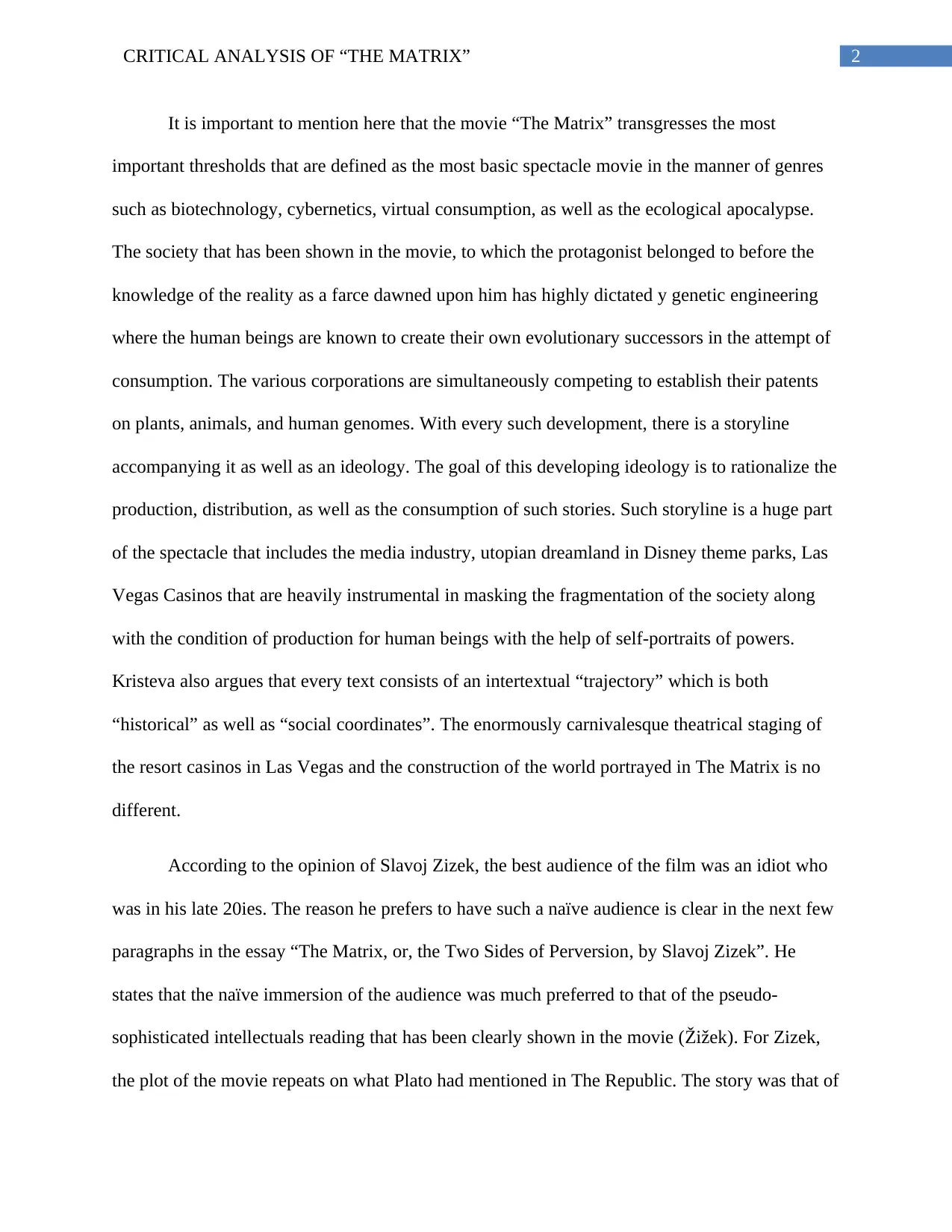
2CRITICAL ANALYSIS OF “THE MATRIX”
It is important to mention here that the movie “The Matrix” transgresses the most
important thresholds that are defined as the most basic spectacle movie in the manner of genres
such as biotechnology, cybernetics, virtual consumption, as well as the ecological apocalypse.
The society that has been shown in the movie, to which the protagonist belonged to before the
knowledge of the reality as a farce dawned upon him has highly dictated y genetic engineering
where the human beings are known to create their own evolutionary successors in the attempt of
consumption. The various corporations are simultaneously competing to establish their patents
on plants, animals, and human genomes. With every such development, there is a storyline
accompanying it as well as an ideology. The goal of this developing ideology is to rationalize the
production, distribution, as well as the consumption of such stories. Such storyline is a huge part
of the spectacle that includes the media industry, utopian dreamland in Disney theme parks, Las
Vegas Casinos that are heavily instrumental in masking the fragmentation of the society along
with the condition of production for human beings with the help of self-portraits of powers.
Kristeva also argues that every text consists of an intertextual “trajectory” which is both
“historical” as well as “social coordinates”. The enormously carnivalesque theatrical staging of
the resort casinos in Las Vegas and the construction of the world portrayed in The Matrix is no
different.
According to the opinion of Slavoj Zizek, the best audience of the film was an idiot who
was in his late 20ies. The reason he prefers to have such a naïve audience is clear in the next few
paragraphs in the essay “The Matrix, or, the Two Sides of Perversion, by Slavoj Zizek”. He
states that the naïve immersion of the audience was much preferred to that of the pseudo-
sophisticated intellectuals reading that has been clearly shown in the movie (Žižek). For Zizek,
the plot of the movie repeats on what Plato had mentioned in The Republic. The story was that of
It is important to mention here that the movie “The Matrix” transgresses the most
important thresholds that are defined as the most basic spectacle movie in the manner of genres
such as biotechnology, cybernetics, virtual consumption, as well as the ecological apocalypse.
The society that has been shown in the movie, to which the protagonist belonged to before the
knowledge of the reality as a farce dawned upon him has highly dictated y genetic engineering
where the human beings are known to create their own evolutionary successors in the attempt of
consumption. The various corporations are simultaneously competing to establish their patents
on plants, animals, and human genomes. With every such development, there is a storyline
accompanying it as well as an ideology. The goal of this developing ideology is to rationalize the
production, distribution, as well as the consumption of such stories. Such storyline is a huge part
of the spectacle that includes the media industry, utopian dreamland in Disney theme parks, Las
Vegas Casinos that are heavily instrumental in masking the fragmentation of the society along
with the condition of production for human beings with the help of self-portraits of powers.
Kristeva also argues that every text consists of an intertextual “trajectory” which is both
“historical” as well as “social coordinates”. The enormously carnivalesque theatrical staging of
the resort casinos in Las Vegas and the construction of the world portrayed in The Matrix is no
different.
According to the opinion of Slavoj Zizek, the best audience of the film was an idiot who
was in his late 20ies. The reason he prefers to have such a naïve audience is clear in the next few
paragraphs in the essay “The Matrix, or, the Two Sides of Perversion, by Slavoj Zizek”. He
states that the naïve immersion of the audience was much preferred to that of the pseudo-
sophisticated intellectuals reading that has been clearly shown in the movie (Žižek). For Zizek,
the plot of the movie repeats on what Plato had mentioned in The Republic. The story was that of
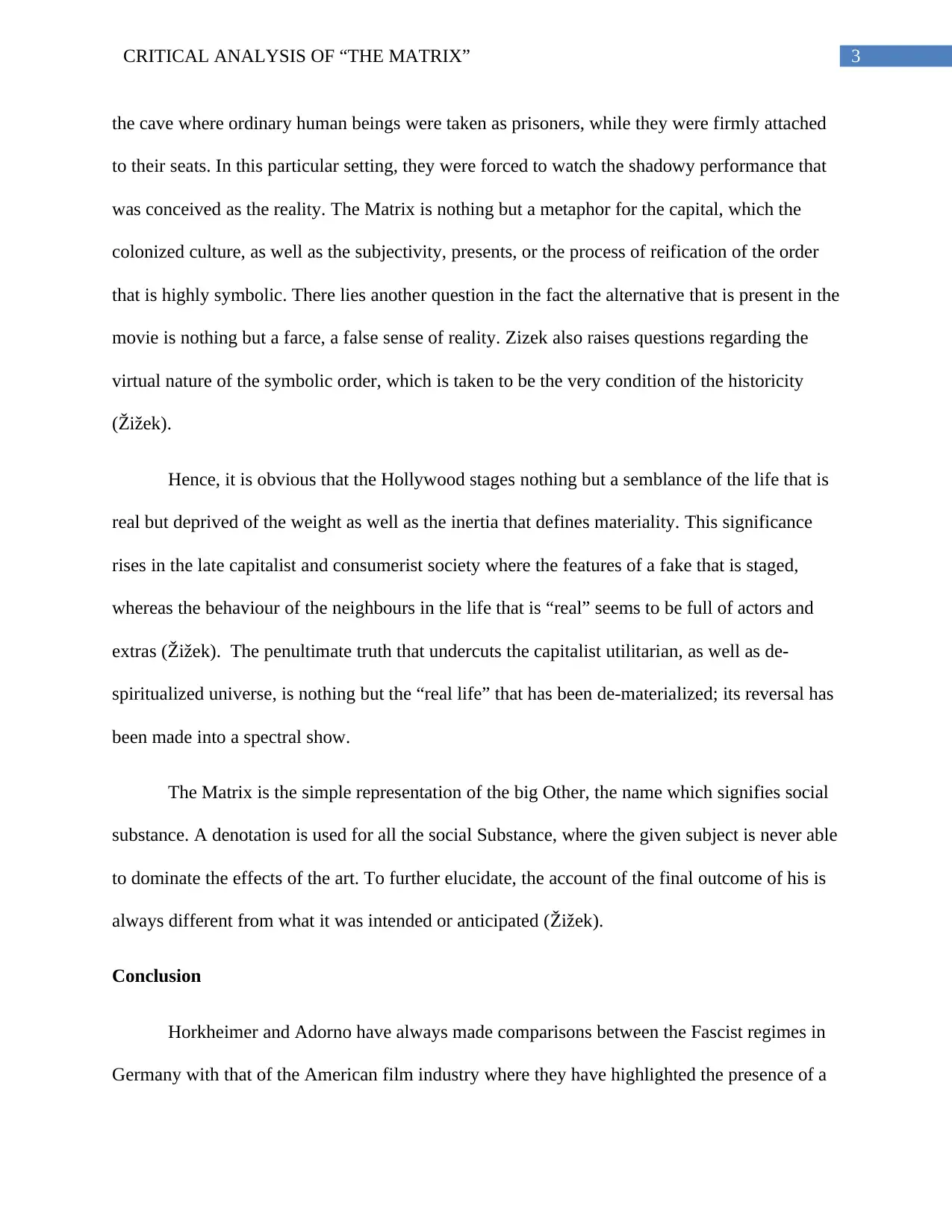
3CRITICAL ANALYSIS OF “THE MATRIX”
the cave where ordinary human beings were taken as prisoners, while they were firmly attached
to their seats. In this particular setting, they were forced to watch the shadowy performance that
was conceived as the reality. The Matrix is nothing but a metaphor for the capital, which the
colonized culture, as well as the subjectivity, presents, or the process of reification of the order
that is highly symbolic. There lies another question in the fact the alternative that is present in the
movie is nothing but a farce, a false sense of reality. Zizek also raises questions regarding the
virtual nature of the symbolic order, which is taken to be the very condition of the historicity
(Žižek).
Hence, it is obvious that the Hollywood stages nothing but a semblance of the life that is
real but deprived of the weight as well as the inertia that defines materiality. This significance
rises in the late capitalist and consumerist society where the features of a fake that is staged,
whereas the behaviour of the neighbours in the life that is “real” seems to be full of actors and
extras (Žižek). The penultimate truth that undercuts the capitalist utilitarian, as well as de-
spiritualized universe, is nothing but the “real life” that has been de-materialized; its reversal has
been made into a spectral show.
The Matrix is the simple representation of the big Other, the name which signifies social
substance. A denotation is used for all the social Substance, where the given subject is never able
to dominate the effects of the art. To further elucidate, the account of the final outcome of his is
always different from what it was intended or anticipated (Žižek).
Conclusion
Horkheimer and Adorno have always made comparisons between the Fascist regimes in
Germany with that of the American film industry where they have highlighted the presence of a
the cave where ordinary human beings were taken as prisoners, while they were firmly attached
to their seats. In this particular setting, they were forced to watch the shadowy performance that
was conceived as the reality. The Matrix is nothing but a metaphor for the capital, which the
colonized culture, as well as the subjectivity, presents, or the process of reification of the order
that is highly symbolic. There lies another question in the fact the alternative that is present in the
movie is nothing but a farce, a false sense of reality. Zizek also raises questions regarding the
virtual nature of the symbolic order, which is taken to be the very condition of the historicity
(Žižek).
Hence, it is obvious that the Hollywood stages nothing but a semblance of the life that is
real but deprived of the weight as well as the inertia that defines materiality. This significance
rises in the late capitalist and consumerist society where the features of a fake that is staged,
whereas the behaviour of the neighbours in the life that is “real” seems to be full of actors and
extras (Žižek). The penultimate truth that undercuts the capitalist utilitarian, as well as de-
spiritualized universe, is nothing but the “real life” that has been de-materialized; its reversal has
been made into a spectral show.
The Matrix is the simple representation of the big Other, the name which signifies social
substance. A denotation is used for all the social Substance, where the given subject is never able
to dominate the effects of the art. To further elucidate, the account of the final outcome of his is
always different from what it was intended or anticipated (Žižek).
Conclusion
Horkheimer and Adorno have always made comparisons between the Fascist regimes in
Germany with that of the American film industry where they have highlighted the presence of a
Paraphrase This Document
Need a fresh take? Get an instant paraphrase of this document with our AI Paraphraser
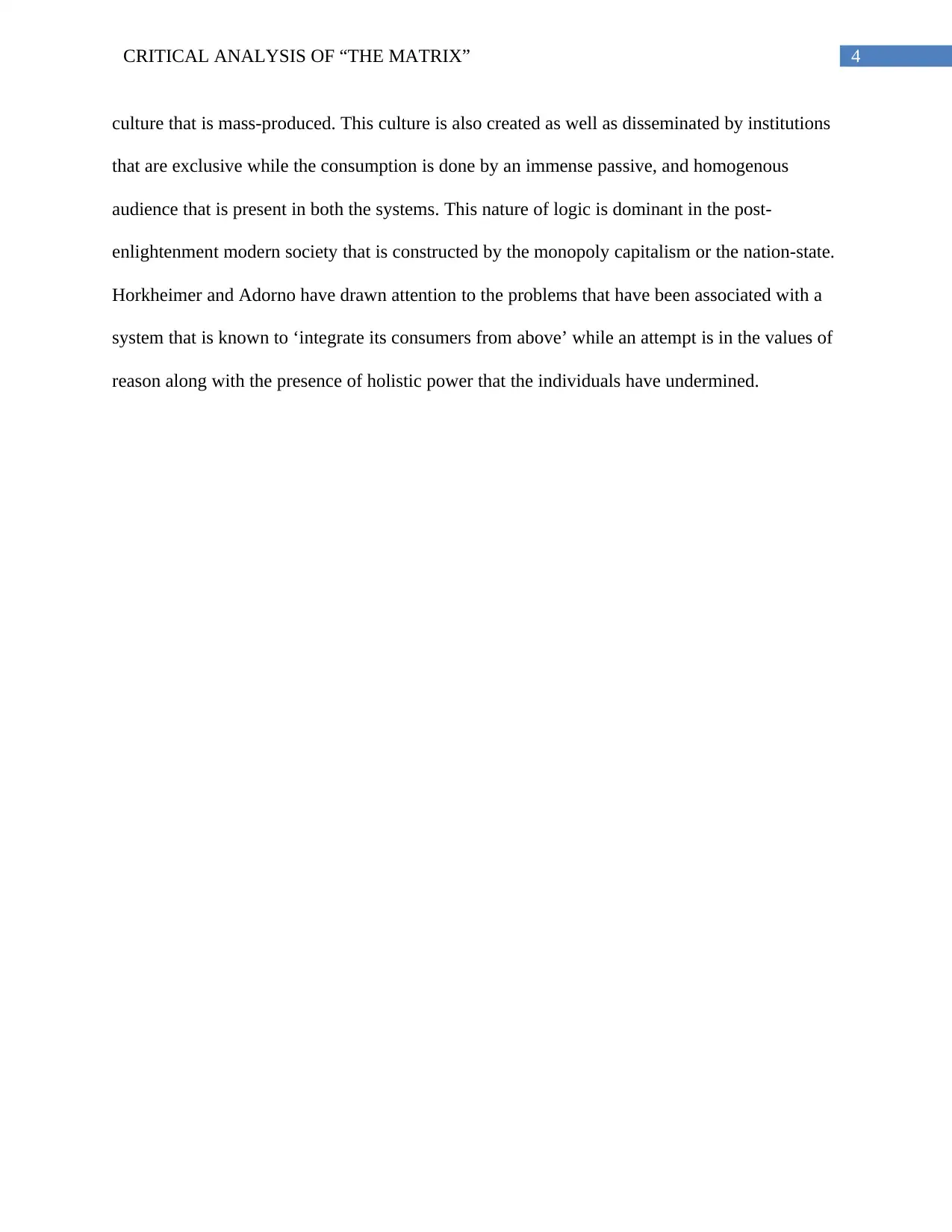
4CRITICAL ANALYSIS OF “THE MATRIX”
culture that is mass-produced. This culture is also created as well as disseminated by institutions
that are exclusive while the consumption is done by an immense passive, and homogenous
audience that is present in both the systems. This nature of logic is dominant in the post-
enlightenment modern society that is constructed by the monopoly capitalism or the nation-state.
Horkheimer and Adorno have drawn attention to the problems that have been associated with a
system that is known to ‘integrate its consumers from above’ while an attempt is in the values of
reason along with the presence of holistic power that the individuals have undermined.
culture that is mass-produced. This culture is also created as well as disseminated by institutions
that are exclusive while the consumption is done by an immense passive, and homogenous
audience that is present in both the systems. This nature of logic is dominant in the post-
enlightenment modern society that is constructed by the monopoly capitalism or the nation-state.
Horkheimer and Adorno have drawn attention to the problems that have been associated with a
system that is known to ‘integrate its consumers from above’ while an attempt is in the values of
reason along with the presence of holistic power that the individuals have undermined.
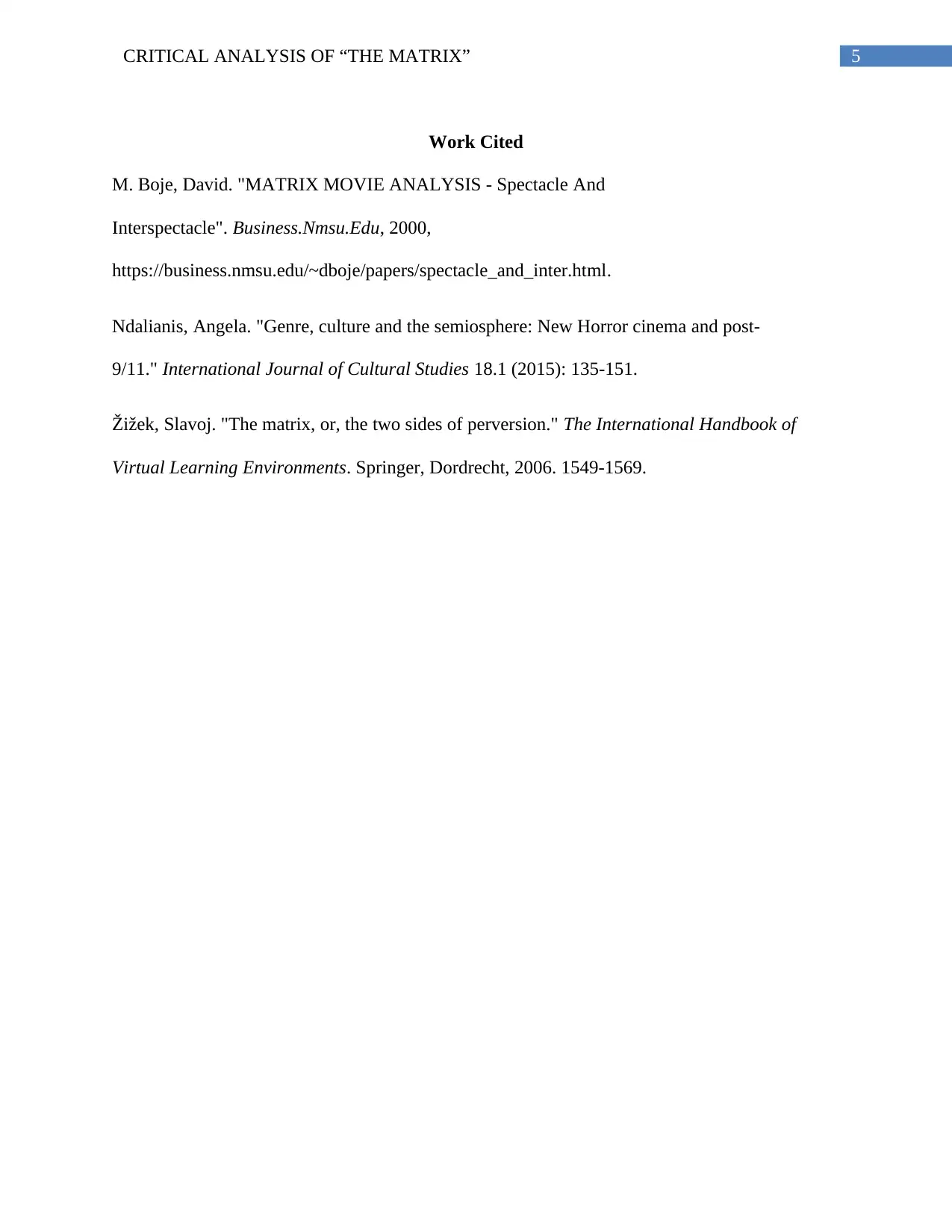
5CRITICAL ANALYSIS OF “THE MATRIX”
Work Cited
M. Boje, David. "MATRIX MOVIE ANALYSIS - Spectacle And
Interspectacle". Business.Nmsu.Edu, 2000,
https://business.nmsu.edu/~dboje/papers/spectacle_and_inter.html.
Ndalianis, Angela. "Genre, culture and the semiosphere: New Horror cinema and post-
9/11." International Journal of Cultural Studies 18.1 (2015): 135-151.
Žižek, Slavoj. "The matrix, or, the two sides of perversion." The International Handbook of
Virtual Learning Environments. Springer, Dordrecht, 2006. 1549-1569.
Work Cited
M. Boje, David. "MATRIX MOVIE ANALYSIS - Spectacle And
Interspectacle". Business.Nmsu.Edu, 2000,
https://business.nmsu.edu/~dboje/papers/spectacle_and_inter.html.
Ndalianis, Angela. "Genre, culture and the semiosphere: New Horror cinema and post-
9/11." International Journal of Cultural Studies 18.1 (2015): 135-151.
Žižek, Slavoj. "The matrix, or, the two sides of perversion." The International Handbook of
Virtual Learning Environments. Springer, Dordrecht, 2006. 1549-1569.
1 out of 6
![[object Object]](/_next/static/media/star-bottom.7253800d.svg)
